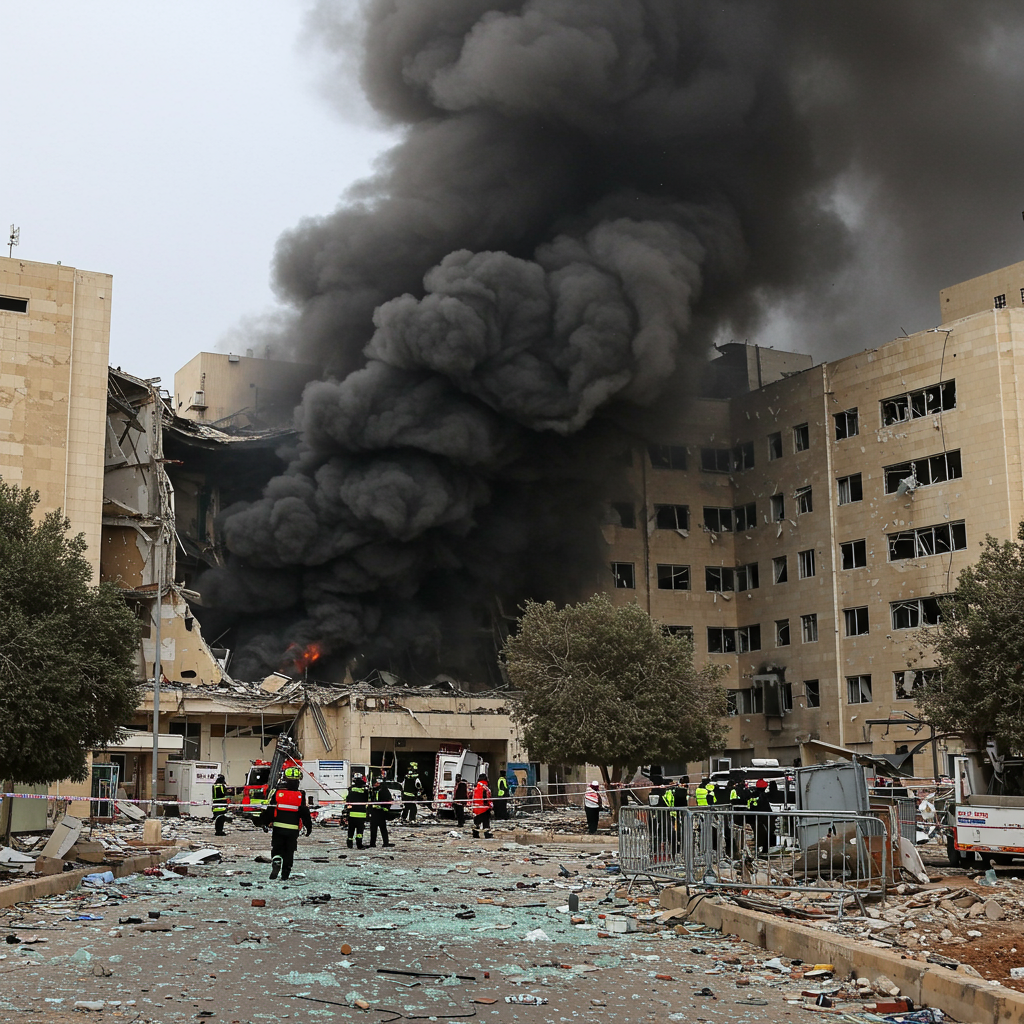An Iranian missile struck the main hospital in southern Israel on June 19, 2025, causing damage, injuring dozens, and immediately drawing fierce condemnation and vows of intensified attacks from Israeli leaders. The incident marked a significant escalation on the seventh day of heightened hostilities between the two nations.
The missile hit the Soroka Medical Center in Beersheba. Israeli media showed scenes of heavy smoke and blown-out windows, but a hospital spokesperson confirmed that the directly impacted section had been evacuated beforehand, helping prevent serious injury to patients or staff. While initial reports cited around 71 minor injuries at the hospital, Israel’s Ministry of Health reported a total of 271 people wounded across the country from the day’s Iranian missile attacks, including four serious injuries.
Iran’s state news agency claimed their missiles targeted an Israeli military intelligence site near the hospital, suggesting any injuries at Soroka resulted from the blast wave rather than a direct strike on the medical facility. However, Israeli officials strongly rejected this claim, describing the hospital strike as “the most severe incident of its kind in the history of Israel’s healthcare system” and a deliberate attack on civilian infrastructure. The Chairman of the Israel Medical Association explicitly labeled it a war crime.
Beyond the hospital, other Iranian missiles landed in populated areas, including a high-rise building and residential structures near Tel Aviv, causing damage and trapping some residents before first responders could assist. Israel’s advanced air defenses intercepted most of the incoming projectiles, but some managed to bypass defenses, leading to impacts in central and southern cities.
Israel Vows “War Crimes” Accountability
Israeli leaders reacted swiftly and forcefully to the attacks, particularly the strike near Soroka Hospital. Defense Minister Israel Katz accused Iran of “war crimes of the most serious kind” and vowed that Iran’s Supreme Leader, Ayatollah Ali Khamenei, would be held directly accountable for these actions, claiming Khamenei authorized the targeting of civilian sites from a “fortified bunker.”
Prime Minister Benjamin Netanyahu condemned the attack near the hospital, promising to “exact the full price from the tyrants in Tehran.” Both Netanyahu and Defense Minister Katz announced they had instructed the Israel Defense Forces (IDF) to significantly increase the intensity of attacks against strategic targets and government sites within Iran. This escalation aims to neutralize threats against Israel and undermine the Iranian regime, according to Katz.
Israeli hospitals had already implemented emergency protocols in the preceding days, converting underground areas like parking garages into makeshift hospital floors to protect vulnerable patients.
New Threat: Cluster Munitions
Amidst the missile barrage, Israel’s Home Front Command issued a warning about a new threat: Iranian “dispersal munitions,” essentially cluster bombs. They stated one missile launched was designed to release approximately 20 smaller bomblets at high altitude, potentially causing damage across a wide radius upon impact. While individually smaller than conventional ballistic missile warheads, these bomblets pose a significant danger across a larger geographic area. The command launched a public awareness campaign, urging anyone who encounters an unexploded bomblet to stay away, avoid touching it, and immediately report it to authorities.
Broader Conflict Context and Nuclear Sites Targeted
The missile attacks on June 19 occurred during the seventh day of an intensified conflict that began with Israeli airstrikes against Iran on June 13. These initial Israeli strikes targeted Iranian military sites, senior officers, nuclear scientists, and facilities across various cities.
In retaliation and as part of their broader strategy, Israel has been conducting strikes against Iran’s nuclear program. One key target was the Arak heavy water reactor near Khondab. Israel had issued warnings for the public to evacuate the area before the strike. Iranian state television claimed the facility was evacuated and reported no radiation danger, a claim supported by the International Atomic Energy Agency (IAEA). The IAEA confirmed the facility was not operational and contained no nuclear material at the time of the strike, thus expecting no radiological effects.
Despite the IAEA urging against strikes on nuclear sites, Israel has also targeted other key facilities, including the uranium enrichment site at Natanz, centrifuge workshops, and a nuclear site in Isfahan. The targeting of heavy water reactors like Arak is significant because they can produce plutonium, offering Iran an alternative path to developing nuclear weapons besides enriched uranium. While Iran had agreed under the 2015 nuclear deal to redesign the Arak facility and sell off heavy water to limit proliferation risks, the IAEA has noted a loss of “continuity of knowledge” about Iran’s heavy water production due to restrictions on inspectors, making full verification difficult.
US Position and Potential Involvement
The escalating conflict coincides with discussions within the United States regarding potential direct involvement in Israel’s efforts to dismantle Iran’s nuclear program. President Trump is reportedly weighing whether the U.S. should formally join Israel’s air campaign. Sources indicated Trump had approved attack plans but had not made a final decision, potentially contingent on whether Tehran agrees to negotiations to abandon its nuclear program. White House press secretary Karoline Leavitt stated President Trump would make a decision within two weeks, influenced by the potential for such negotiations.
Israel has reportedly requested specific U.S. military assets, such as a bunker-busting bomb, to target deeply buried facilities like the Fordow enrichment plant. The U.S. has also deployed naval destroyers to the eastern Mediterranean in a show of force. Meanwhile, Iran’s Supreme Leader Ayatollah Ali Khamenei has warned the U.S. against joining Israel’s actions, threatening “irreparable damage” if the U.S. becomes militarily involved.
Casualty figures from the intensified conflict are grim. According to a Washington-based Iranian human rights group, at least 639 people, including 263 civilians, have been killed in Iran since Israel’s bombing campaign began. In Israel, Iranian retaliatory strikes, including missiles and drones, have resulted in at least 24 deaths and wounded hundreds.
The situation remains highly volatile, with Israel doubling down on its commitment to intensify attacks and hold Iran’s leadership accountable following the strikes on civilian targets like the Soroka Medical Center.


